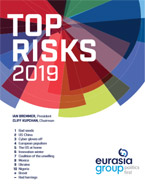 Ian Bremmer, Cliff Kupchan
Ian Bremmer, Cliff Kupchan
Publisher Eurasia Group
Overview: The geopolitical environment is the most dangerous it’s been in decades … and at a moment when the global economy is faring well. Markets are increasingly volatile but resilient, taking hits but mostly bouncing back. What’s wrong with this picture?
Nothing … yet. Geopolitical cycles are slow-moving. It takes a long time to build a geopolitical order; governments change course through the workings of complex institutions, coalition politics, election cycles, and checks and balances. Multilateral institutions take decades to build, and they gain momentum slowly. Norms and values need to develop, to become accepted, and to shape institutions and societies over time. Once in place, they’re sticky. And so, barring bad luck (read: a sudden unforeseen crisis), it takes years, even decades to knock down a geopolitical order. That process of erosion is underway around the world today.
Sure, 2019 could turn out to be the year the world falls apart. Tail risks created by bad actors inflicting damage that then create an escalatory cycle are higher than they’ve been at any point since we launched Eurasia Group in 1998. A Russian cyberattack gets out of control. Iran and Saudi Arabia (or Israel) trigger a Middle East war. The Chinese and Americans get into a trade war that causes a deep recession, they blame one another, and retaliation spills into the kinetic space. There are other risks of similar scale. But for now, all of these remain low-likelihood events.
More likely, and despite increasingly worrisome headlines, 2019 is poised to be a reasonably good year. Even, dare we say it, not a particularly politically risky year. But we’re setting ourselves up for trouble down the road. Big trouble. And that’s our top risk.
